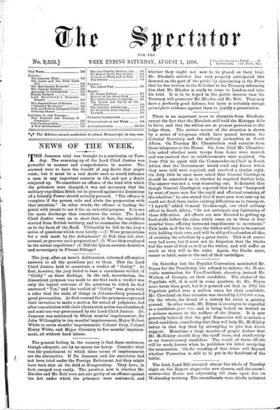The Irish Land Bill occupied almost the whole of Tuesday
night on the Report stage—the new clauses, and the amend- ments—the House not adjourning till close upon five on Wednesday morning. The amendments were chiefly technical, amendments of a drafting kind, but the Nationalists made a last endeavour to reduce ' the statutory period from fifteen years to ten, the Ulster tenants, as represented by Mr. Ren- toul and Mr. T. W. Russell, speaking for the shorter period. They were, however, resisted by the Government, who declined to shake confidence in a Parliamentary settlement by changing it on the very first opportunity, and the amendment was rejected by a majority of 71 (172 to 101), even Colonel Saunderson congratulating the Government on sticking to its decision. Nevertheless, when the third reading of the Bill was moved on Wednesday afternoon, Mr. Smith-Barry and Colonel Saunderson supported its rejection on the ground,— for which they did not find mach evidence—that the Govern- ment had given way to the tenants' and had rejected the landlords' amendments to their Bill,—their only plausible instance being that Mr. Gerald Balfour's amendments to Clauses 4 and 13 had been withdrawn in order to shorten the discussion on the Bill, to the consideration of which a reason- able time had not been allotted by the Government. And no doubt the changes intended to diminish the cost of proceedings under the Act,—and for that reason very important,—were abandoned for want of time, but that was a poor justification for moving the rejection of the Bill on the third reading, as the Irish landlords did, though it was the most weigLty of the reasons they had to advance.



































